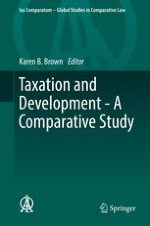2017 | OriginalPaper | Buchkapitel
13. Extensive Treaty Network and Unilateral Credits Support Foreign Investment: The Dutch Approach
verfasst von : Raymond H. C. Luja
Erschienen in: Taxation and Development - A Comparative Study
Aktivieren Sie unsere intelligente Suche, um passende Fachinhalte oder Patente zu finden.
Wählen Sie Textabschnitte aus um mit Künstlicher Intelligenz passenden Patente zu finden. powered by
Markieren Sie Textabschnitte, um KI-gestützt weitere passende Inhalte zu finden. powered by
